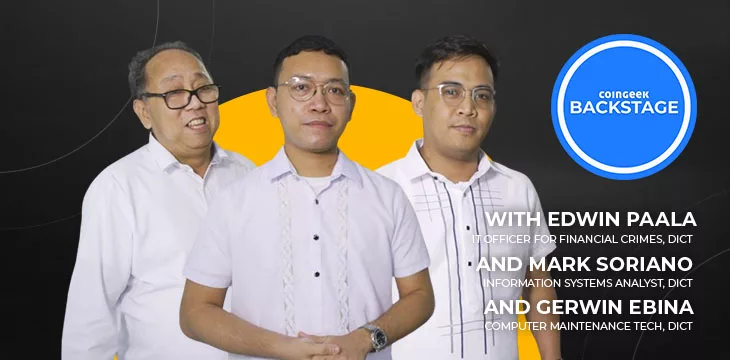|
Getting your Trinity Audio player ready...
|
A lot is in store for the Philippines, with the national government and private institutions like nChain developing plans to ramp up the country’s digital transformation.
With the Philippines’ digitalization in full throttle, experts in the public sector are arming themselves with knowledge on blockchain technology, the primary tool that the country is looking into utilizing to achieve the initiative.
Speaking to CoinGeek Backstage on the sidelines of nChain’s Blockchain 101 workshop, computer maintenance technologist at the Department of Information and Communications Technology (DICT), Gerwin Kier Ebina, said local officials and experts have known about blockchain for quite some time now but its implementation on government services have yet to be made.
“So, we’re quite interested to join this Blockchain 101 since it’s some kind of refreshing knowledge for us,” he noted, adding that the short crash course gave them a deeper understanding of blockchain’s potential use cases and how it can be integrated and effectively use in government and enterprise operations, especially in the DICT, whose efforts are heavily focused on data management.
Besides serving as a refresher, Ebina said the workshop also simplified complex terminologies tied to the blockchain, including nodes and public and private keys.
“Previously, we’re not familiar with blockchain on [the] operation side, only on theoretical, so having this Blockchain 101 will greatly help the team on exploring the technology,” he said, noting that gaining an understanding of these terminologies is crucial in developing solutions and their implementation.
While blockchain has yet to be fully integrated into the government’s internal systems and operations, system analyst at DICT Mark Soriano said some key components of the technology have already been introduced in projects like the department’s digital certificate.
“We have this digital certificate where we use a private key and public key,” he told CoinGeek Backstage reporter Claire Celdran, adding that apart from the basics of the emerging technology, nChain experts also explain blockchain’s security and privacy.
The blockchain course also delved into digital currencies and their transaction size, which Soriano said he was not an expert on as his position in the department focuses on internal systems development. Despite the lack of familiarity with such concepts, Soriano said the discussion was insightful, noting that learning them is vital in this digital era.
As government officials learn about the technology, Soriano reiterated what experts and industry leaders have been calling for in recent months—to educate the public on the technology and how it can benefit them in the long run. Besides that, there is also a need to consider the cost of integrating blockchain into government operations.
“The end users must be oriented on what’s the benefits, the value proposition of the blockchain and then for that to be implemented, also you need to consider the cost,” Soriano pointed out. “Based on the discussions earlier, [we] need also to consider those equipment that will be used in implementing that technology.”
With the Philippines working toward fully digitalized networks, Edwin Paala said the risk of the country experiencing cyber attacks is high.
While there have been numerous advancements in various technologies in recent years, Paala sees blockchain as a key to boosting the country’s security and would be extremely beneficial in fighting financial crime.
Blockchain, through Bitcoin, managed to onboard Filipinos into the financial market. But while this is a positive development in the digital era, it presents new challenges in the cybersecurity field, emphasized Paala, who works as an IT officer for Financial Crimes at the DICT Cyber Crime Coordination Center.
“Financial crime is a major concern for the agency…what’s so interesting about blockchain is one, it is now past innovation. People actually have some sense of what is actually Bitcoin, but the good thing [is] over time, you now have an authority on it,” he explained. “It’s no longer just a venture, but when you deal with financial crime, you actually deal with financial markets and consumers, and that is what Bitcoin is—it’s bringing consumers and markets.”
“Bitcoin will present a very big opportunity,” Paala said, adding that the Philippines is ready to implement and exploit blockchain in its future projects.
“Because of Republic Act 11765, which is the Financial Consumer Protection Act (FCPA), the Philippines decided to bring regulators together,” stated Paala, while enumerating the Securities and Exchange Commission (SEC), the Bangko Sentral ng Pilipinas (BSP), the Insurance Commission, and the Cooperative Development Authority (CDA) in bringing emerging technologies to the greater masses.
While the government has the capacity to bring blockchain to the table, a contributor to ensuring its successful implementation is a Bitcoin blockchain provider that is well-versed in the technology and is willing to actively work with the national administration.
Echoing Soriano’s earlier statement, Paala said awareness is crucial for blockchain acceptance in the Philippines, a country with a high percentage of unbanked individuals.
“People who are unbanked try to remain unbanked, but if you bring some innovation to the picture like Bitcoin, you’re taking a different approach…you can get a different result or a better result,” concluded Paala.
According to a 2023 McKinsey & Company report, roughly 44% of the Philippines’ bankable population is unbanked.
Watch: Philippines sees huge growth in blockchain tech interest

 02-16-2026
02-16-2026 




